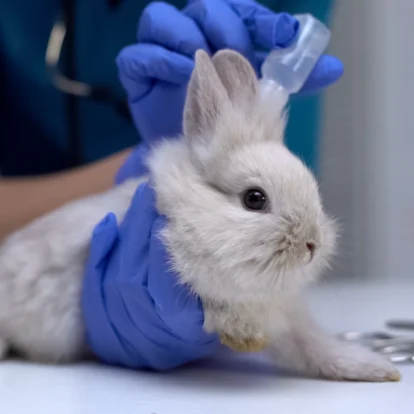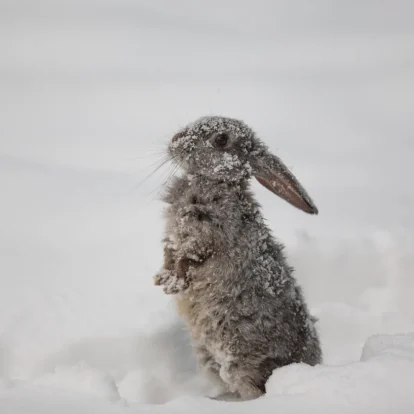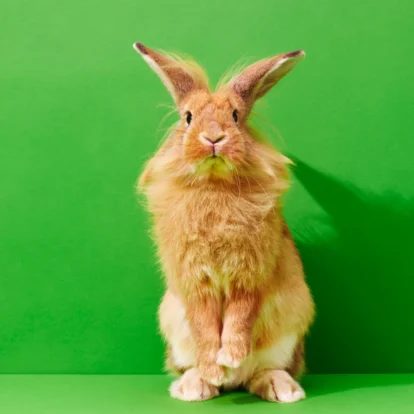Table of Contents
Introduction to Rabbit Poop
Hey, bunny parents out there! Have you ever found yourself gazing at your rabbit’s droppings, deciphering what they’re trying to tell you? Well, you’re not alone. Most of us rabbit enthusiasts have been there, too. With many years in the bunny 🐰 field, I can tell you this much – rabbits poop is more than just waste. It’s a window 🪟 into your bunny’s health and a key to understanding their diet!
Believe it or not, dissecting the world of rabbit droppings is a bit like reading tea leaves. Everything from size and texture to frequency can give you crucial clues about your little furball’s health. A healthy rabbit will poop 💩 regularly – and by regularly, I mean throughout the day. These tiny balls of wisdom, a.k.a rabbit droppings, should generally be uniform in size, perfectly normal, and plentiful. Yep, when it comes to rabbits, more poop equals a happier bunny!
But hold up! What happens if the droppings deviate from the norm? Suppose your bunny’s droppings are smaller than usual, or you’ve noticed a change in color or consistency. In that case, my friend, it might indicate an underlying health problem.
Just as important as knowing what normal rabbit poop looks like is realizing when it’s time for a vet visit. So, prepare to become a poop-savvy bunny parent as we dive deeper into the world of rabbit droppings! Because just like we humans, what rabbits eat can affect their health!
Remember, few bunnies are alike, and what’s perfectly normal for most rabbits might not be the case for all. So, stay tuned and keep those pellets primo!
Deciphering the Language of Rabbit Droppings
Now, let’s get down to the nitty-gritty of bunny poopology. When it comes to rabbit droppings, there are three main categories to be aware of (1) normal rabbit poop, (2) cecotropes (the fancy ones), and (3) abnormal poop (the kind that’s a real cause of concern). Yes, you heard it right, three types -and multiple subtypes-! Who knew that something as simple as poop could be so complex?
So, buckle up, bunny parents, we’re about to embark on a grand tour of the mysterious land of rabbit droppings – because your furball deserves the best poop patrol! 🚓
1. Normal Rabbit Poop


When you think of normal rabbit poops, you’re probably picturing fecal pellets. These regular droppings from your bunny are small, round balls that are typically dark brown in color. As a responsible rabbit owner, you’ll learn to love these healthy rabbit poop pellets. Why? Well, a steady production of these little nuggets is a reliable sign that your rabbit’s diet is on point, possibly including fresh hay, and their digestion is running smoothly. 🙌
Size and Consistency of Normal Rabbit Poop


Now, let’s talk about size and consistency. Normal bunny poop is about the size of a pea – cute, just like your bunny!
In terms of consistency, they should be firm (but not too hard) and dry. You shouldn’t be able to easily squish a healthy bunny poop, and it definitely shouldn’t be soft or watery. If it sticks to the bottom of your bunny’s cage, that’s a red flag, folks! 🚩
Some More Insight on Normal Rabbit Poop
Keep an eye out for the color too! A healthy diet for your bunny pal, chock-full of hay and leafy greens, should produce poop that’s a nice dark brown. But remember, variations can occur depending on the types of food your fluffy friend is munching on. A shade of green or slight color change is nothing to worry about if your bunny is happy and eating well. Remember, in the world of rabbits, being a poop whisperer means getting to know your bunny’s personal poop profile! 👀💩
The Smell of Normal Rabbit Poop
You might be wondering about the smell, bunny parents. Normal rabbit poop shouldn’t have a strong or foul odor. Generally, it would carry a mild, slightly musky scent. If you detect a potent smell from your bunny’s droppings, it could be a warning sign that something isn’t quite right in their diet or overall health.
Remember, a healthy bunny poop doesn’t stink up the place. So if your rabbit’s poop is smelling foul, it might be time for a vet visit. Don’t forget, being a bunny poop whisperer is all about using your senses.🐰👃. Also, if you detect a strong scent coming from your furry friend’s litter box, it’s most likely the smell of their urine, not the poop.
2. Cecotropes


Now, let’s talk about some mystery guests in the world of bunny poops. Cecotropes are not your usual rabbit poo. They’re a bit like the special guests at the bunny poop party, appearing only once or twice a day. Cecotropes are softer, stickier, and usually darker than normal poops. They are an essential part of your bunny’s diet; rabbits typically eat them directly from their anus. Sounds odd, right? But it’s completely normal and a crucial part of their nutrition.
Cecotropes have all the nutrients and beneficial bacteria to help maintain your furball’s gut health! So, if you spot these little cecotropes in your rabbit’s litter box or around their living area, don’t panic. It’s just nature’s way of keeping your bunny healthy.
3. Abnormal Poop
In the realm of rabbit poop, not all droppings are created equal. It’s essential to keep an eye out for abnormal rabbit poop, which may include changes in size, color, and consistency. For example, notice your bunny’s droppings are smaller or larger than usual, or there is a noticeable color change. It might be time to consult with a vet. Similarly, if their droppings are coated in a layer of poop mucus, it’s definitely a red flag. Remember, understanding the language of bunny poops is vital to keeping a happy, healthy bunny!
Alright, buckle up, bunny buddies! We’re about to dive into the wild world of not-so-ordinary rabbit droppings. Get ready to explore some quirky examples of what happens when bunny poop goes a bit off-script. It’s like a behind-the-scenes tour of the bunny digestive drama! 🐇💩
Small or Elongated Poop


If you find your rabbit’s poops have become noticeably smaller or have taken on an elongated oval shape, it could be a sign that your bunny isn’t getting enough fiber in their diet. Fiber is crucial for a rabbit’s digestive tract, helping to maintain the balance of gut bacteria and keep things moving smoothly. Consider adding more timothy hay into their meal times, as it’s jam-packed with fiber and loved by rabbits! Small poop can also be a symptom of dehydration, so make sure your furball always has access to fresh water.
Double Poops

Seeing double? 👀 Double poops, or two fecal pellets stuck together, could be signaling that your rabbit is getting too many pellets and not enough hay. Too many pellets can lead to GI stasis, a potentially lethal condition where the digestive system slows down or stops. You want a good balance of hay, pellets, and water in your bunny’s diet to keep the rabbit’s cecum, a part of the digestive system, functioning correctly.
If you suspect your rabbit is experiencing GI stasis, consult a vet immediately.
Poop Strung or Hairy Poop


If you’re dealing with a case of hairy poop – fecal pellets strung together with rabbit’s fur – it’s a sign your bunny is grooming a bit too much and ingesting their fur. If your house rabbit is molting, keep an eye on those rabbit fecal pellets! Ingested hair can slow down the digestive system, so brushing your rabbit regularly is essential, especially during molting seasons.
You can also add pet-safe papaya tablets to their diet, which contain enzymes that help break down and pass the fur through their system.
Poop with Mucus

Poop with mucus can look a bit like a “poopy butt”, but it’s definitely something to take seriously. This abnormal rabbit poop suggests that your rabbit’s digestive tract is upset, possibly due to too much sugar or protein in their diet. Take a look at their treats – are you giving too many treats with too much sugar or protein? Time to cut back!
When dealing with mucus in your rabbit’s poop, it’s essential to act quickly and consult with a vet. Mucus in the fecal matter is not a common occurrence. It might indicate a critical health issue like bacterial imbalance or parasitic infections.
While checking their treats, be extra observant of any changes in your rabbit’s behavior, particularly any loss of appetite, lethargy, or changes in their regular poop routine. Always remember swift intervention is vital to keeping your furry friend healthy and happy.
Diarrhea
True diarrhea is not common in rabbits and is a serious concern. It’s sorta of like a red flashing light saying, “Emergency! Emergency!” 🚨. Runny stool differs from the normal soft rabbit poop or cecotropes, and it’s a sign to get in touch with your vet immediately. According to the House Rabbit Society, true diarrhea can quickly lead to severe dehydration and needs immediate attention. Remember, a healthy bunny is a poop-savvy bunny!
4. Not popping at all
If your bunny is not pooping at all, it’s a pretty big deal, folks! Think of it as your rabbit’s way of playing a game of charades – it’s trying to tell you something. A baby rabbit 🐰 missing a poop session or two might seem like a minor hiccup, but it could be a sign of something more serious.
Gastrointestinal (GI) stasis is common in rabbits, where the digestive system slows down or stops. The absence of the usual fecal pellet could mean an intestinal blockage or other issues with the rabbit’s gut. In this case, don’t wait for the next scheduled poop session, guys. Act fast!
Get in touch with a rabbit-savvy veterinarian immediately. These experts have seen it all, and they know the ins and outs of the rabbit digestive system like the back of their hand. They’ll do an examination, maybe take X-rays, and then, bingo! They’ll figure out what’s going on in your bunny’s tummy.
Remember, a silent bunny is not always a happy bunny, especially if they’ve hit a pooping pause. So, don’t ignore if your rabbit missed its regular poop routine. Keeping those pellets coming for a healthy, happy bunny is essential!
Prevention is Better Than Cure, Mate!
Alright, let’s talk prevention. Keeping your bunny’s gut happy and healthy is the key to avoiding GI stasis and other poop-related issues. And how do we do this, you ask? Well, it’s all about diet, hydration, and regular exercise – just like us humans, really! 💁♂️
- Diet: Let’s start with the diet; it’s a biggie. Your rabbit’s diet should consist of a lot of hay, some fresh vegetables, a bit of fruit, and a smidge of rabbit pellets. Hay is super important because it’s loaded with fiber, which keeps things moving in the gut. 🌾
- Hydration: Keep that water bowl filled up, folks! Hydration plays a vital role in digestion. Water helps the gut process all that fibrous hay and keeps those poops well-formed. 💦
- Exercise: Let your bun-bun stretch its legs. Exercise helps stimulate digestion and keep the GI tract active. So, open up that cage and let the bunny play!
- Regular vet visits: Taking your bunny to the vet for regular check-ups is also essential. Your vet can ensure your rabbit is healthy and catch any potential issues early on.
Fun Fact: Did you know you can use your rabbit’s poo as a super fertilizer?
That’s right, bunny poop is nature’s little gift to gardens. It contains essential plant nutrients and can help keep them healthy and happy.
So, you’ve got some bunny droppings and asking, “How do I turn this into plant gold?” It’s as simple as 1, 2, 3! First, scoop up those pellets, taking care not to pick up any soiled with urine – we want pure pellet power here, folks! Next, sprinkle those little nuggets directly into your garden soil or mix ’em into your compost pile. Like a magic trick, they’ll break down and enrich the soil with nutrients. Remember, moderation is key – a sprinkle here, a sprinkle there, just like adding pepper to your favorite dish. Before you know it, your plants will be as vibrant and bouncy as your little furball. It’s like the circle of life, bunny-style! 🌱🐇🌼
So, next time you’re cleaning out your rabbit’s litter box, don’t just toss those poops – use them to give your garden a boost!
Final Thoughts on Rabbit Poop
When it comes to your bunny’s health, every little detail counts, and understanding rabbit poop is no small feat. By being a mindful observer of your fluffy friend’s poops, you’re playing a vital role in their well-being.
With the proper diet, like rabbit unlimited hay, you’re aiding in maintaining a healthy rabbit’s digestive system. The hay isn’t just for munching – it’s packed with fiber that helps push everything along the gut and keep the natural bacteria in balance.
Remember, a bunny with a healthy gut is a happy bunny. Keep poop-sleuthing and let those droppings speak volumes about your rabbit’s health. These little signs are the key to ensuring your furball stays as bouncy and vibrant as ever. 💩🔍🐇
Related Questions
How Many Times Does a Rabbit Poop Per Day?
As rabbit parents, it might seem like our hoppy companions are forever on a poop-athon 🏃🐇. These little furballs are poop machines! Depending on their size and diet, a healthy rabbit can produce anywhere from 200 to 300 poops per day. Yes, you read that right! Now, before you start side-eyeing your bun, remember this is totally normal and a great sign that your fluffy friend’s digestive system is working like a charm.
So, next time you’re doing a clean-up, don’t grumble about the poop fest – take it as a sign that your rabbit is happy, healthy, and living their best bunny life! 💩🐇💓
Can Rabbit Poop Affect Humans?
Well, under normal circumstances, rabbit poop is relatively safe and poses little to no risk to humans. But here’s the kicker: hygiene is everything! When handling bunny droppings, especially if you’re getting dirty in the garden, always wash your hands thoroughly afterward.
Also, in rare cases, if your bunny is sick, harmful bacteria could be present in their droppings. So, when in doubt, it’s always a good idea to wear gloves and keep those hands clean! 🧤🐰💩😄



